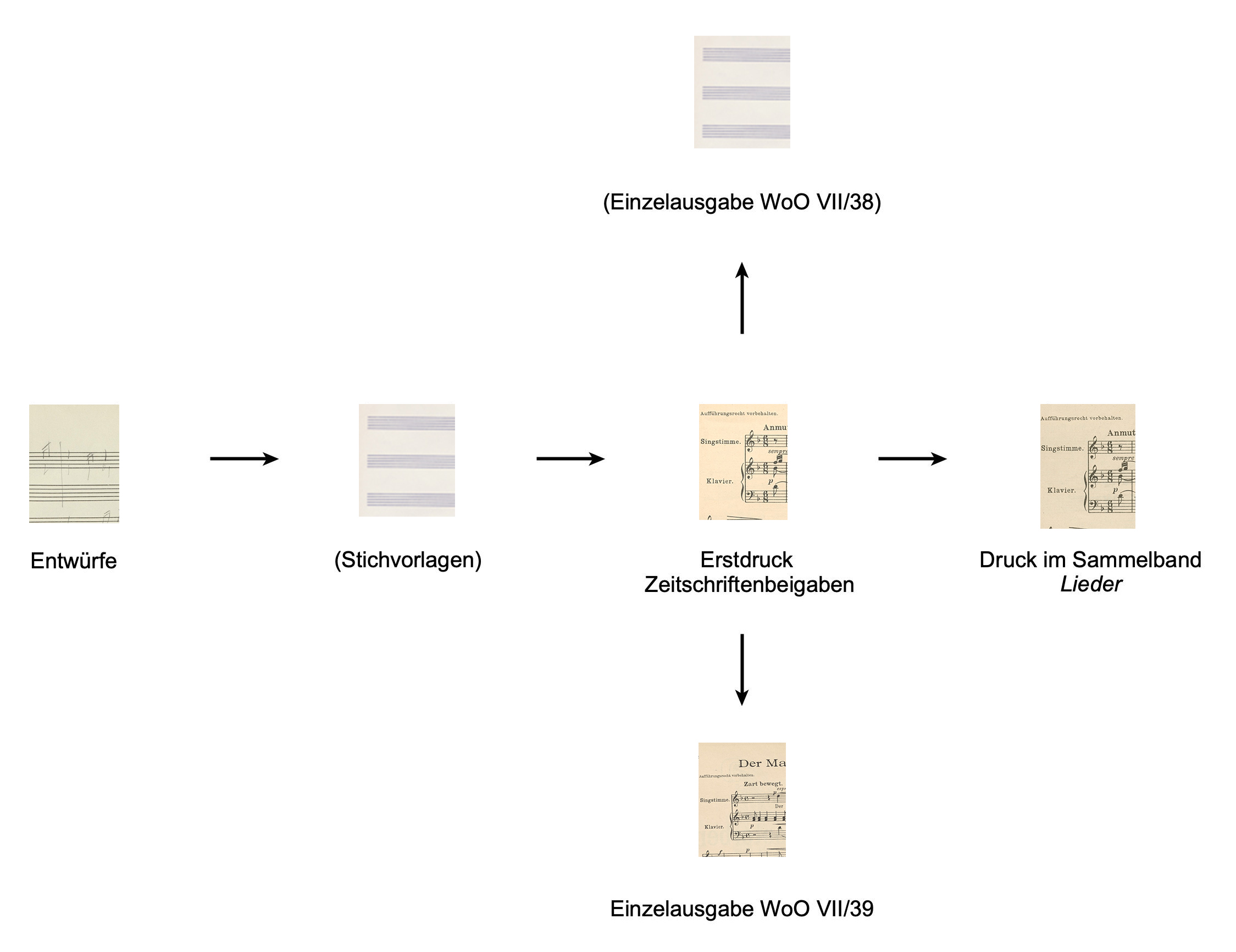Der Maien ist gestorben WoO VII/39
for Singstimme und Klavier
-
Text: Rosa Gerheußer
- –
- –
- –
1.
| Reger-Werkausgabe | Bd. II/5: Lieder V, S. 4–6. |
| Herausgeber | Knud Breyer und Stefan König. Unter Mitarbeit von Christopher Grafschmidt und Claudia Seidl. |
| Verlag | Carus-Verlag, Stuttgart; Verlagsnummer: CV 52.812. |
| Erscheinungsdatum | Oktober 2024. |
| Notensatz | Carus-Verlag, Stuttgart. |
| Copyright | 2024 by Carus-Verlag, Stuttgart and Max-Reger-Institut, Karlsruhe – CV 52.812. Vervielfältigungen jeglicher Art sind gesetzlich verboten. / Any unauthorized reproduction is prohibited by law. Alle Rechte vorbehalten. / All rights reserved. |
| ISMN | M-007-33910-4 |
| ISBN | 978-3-89948-463-2. |
Rosa Gerheußer: Der Maien ist gestorben, in:
Rosa Gerheusser: Gedichte, Im Selbstverlag der Verfasserin, Stuttgart
unknown
Used for comparison purposes in RWA: First edition
Copy shown in RWA: DE, Stuttgart, Württembergische Landesbibliothek, 24/14506.
Note: In Erstausgabe Titel mit dem Zusatz: “Vertont von Max Reger †”.
Note: Reger erhielt das Gedicht möglicherweise von der Stuttgarter Autorin im Manuskript oder Typoskript. Eine Veröffentlichung ist erst 1917 nachweisbar (neben der Buchausgabe auch Illustriertes Mittwochsblatt. Beilage zur Leitmeritzer Zeitung, 9. Jahrgang, Nr. 27 [4. Juli 1917], S. [4]; der Titel ist dort mit demselben Zusatz versehen).
1. The genesis and publication
On 6 December 1905, Reger wrote to the writer Ernst Ludwig Schellenberg to thank him for sending his book entitled Gedichte (“Poems”, Berlin 1902), from which he had selected “the 2 little songs ‘Der Dieb’ [‘The thief’] and ‘Schelmenliedchen’ [‘Little song of a rascal’]” for his “next Schlichte Weisen”.1 However, this new, third volume of Schlichte Weisen was not completed until the early summer of 1907, and only “Schelmenliedchen” found a place in it.
Reger had actually had an earlier reason for composing “Der Dieb”, however. In 1904, the publishing house of W. Vobach & Co. of Berlin and Leipzig, which published the Sonntags-Zeitung fürs Deutsche Haus (“Sunday paper for the German home”) had begun publishing the periodical Die Musik-Mappe (“The music folder”). As of October 1905, individual issues of this publisher’s magazine began to appear each month, “alternating between songs, dances and salon pieces”, though they featured “only originals, i.e. works of music that have never been published before”. These magazines were given their own cover colour depending on the genre of music featured and the publisher hoped that “for the broadest circle of music-lovers, it should be the equivalent of a good, easy-reading magazine for literature-lovers”.2
Reger had already written several pieces for publication in music journals or interdisciplinary, cultural magazines3 and was presumably approached by the magazine in question to provide a contribution. The editors, headed by the singer and composer Felix Lederer-Prina, had already been able to persuade Engelbert Humperdinck, Carl Reinecke, Wilhelm Kienzl and others to collaborate. Reger’s post book documents a registered letter sent to the Berlin editors of the Musik-Mappe on 13 June 1906, which was presumably when he submitted his manuscript.4 In addition to “Der Dieb”, he also submitted “Der Maien ist gestorben” (“May has died”). The poem for this song was by Rosa Gerheusser, and was only published later.5 The composer had presumably received it from her in manuscript form.
Both these songs were published in August 1906 in the 24th issue of the Musik-Mappe6 and were shortly afterwards also published separately by the same publisher.7
2.
Translation by Chris Walton.
1. Reception
At present, there are no records of performances in Reger's time.
1. Stemma

2. Quellenbewertung
Den Editionen liegt als Leitquelle jeweils der Erstdruck als Zeitschriftenbeigabe zugrunde. Die weiteren zu Regers Lebzeiten erschienenen greifbaren Drucke (Einzelausgaben WoO VII/38 und WoO VII/39, Sammelband) verwenden dieselben Platten ohne Änderungen des Notentextes. Die Entwürfe spielten bei editorischen Entscheidungen keine Rolle.
3. Sources
- Entwurf (mit WoO VII/38) (E)
- Stichvorlagen (mit WoO VII/38) (verschollen)
- Erstdruck Zeitschriftenbeigabe (mit WoO VII/38) (ED-Z)
- Erstdruck Einzelausgabe (ED-E)
Object reference
Max Reger: Der Maien ist gestorben WoO VII/39, in: Reger-Werkausgabe, www.reger-werkausgabe.de/mri_work_00264.html, version 4.0, 18th December 2025.
Information
This is an object entry from the RWA encyclopaedia. Links and references to other objects within the encyclopaedia are currently not all active. These will be successively activated.